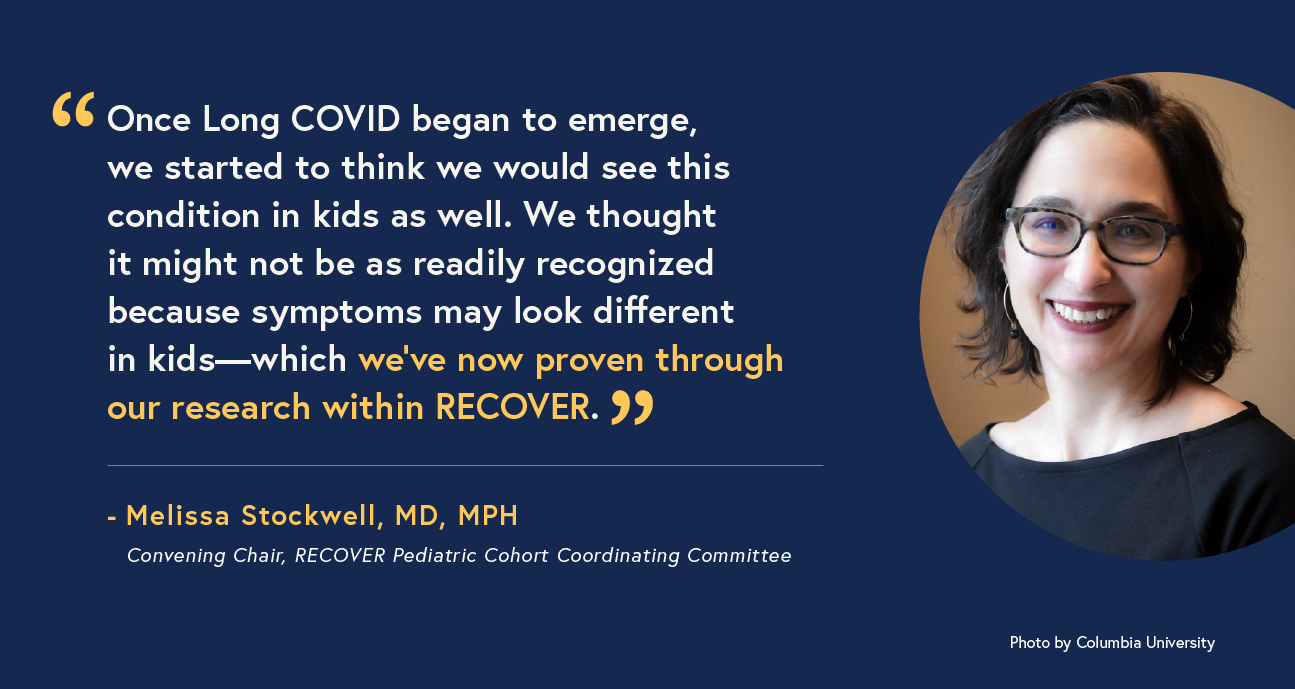“A shared mission”: RECOVER researcher committed to sharing knowledge about pediatric Long COVID

Dr. Stockwell says she and her fellow RECOVER researchers have a responsibility to share information widely to ensure that doctors understand what Long COVID looks like in children.
Pediatrician and RECOVER researcher Melissa Stockwell, MD, MPH, has conducted research on both pandemics and vaccination since before the COVID-19 outbreak. After the COVID-19 pandemic began, she worked on projects with the Centers for Disease Control and Prevention (CDC) to track transmission of SARS-CoV-2 (the virus that causes COVID-19).

“At the beginning of the pandemic, there was a misconception that kids didn’t get COVID or that it would always be mild,” she explained. “However, we started seeing kids who were really sick, and some who were unfortunately dying (from COVID).”
As Columbia University’s division chief of child and adolescent health and director of the child and adolescent health clinical service at NewYork-Presbyterian Morgan Stanley Children’s Hospital (NYP-MSCH), Dr. Stockwell also oversaw the rollout of the COVID-19 vaccine at NYP-MSCH and ensured it was available to children once approved. She leaned on knowledge gained from her research, which focuses on family perspectives about vaccination.
“Once Long COVID began to emerge, we started to think we would see this condition in kids as well,” she said. “We thought it might not be as readily recognized because symptoms may look different in kids—which we’ve now proven through our research within RECOVER.”
Her department at Columbia applied to join the RECOVER network in the early days of the initiative. Because of her expertise with COVID-19 and vaccination, Dr. Stockwell led the application. Today, she is RECOVER’s convening chair of the Pediatric Cohort Coordinating Committee, meaning that she leads the group that makes decisions about RECOVER’s pediatric observational study. She is also the principal investigator of RECOVER’s hub housed at Columbia.
One of Dr. Stockwell’s primary goals in joining RECOVER was to ensure the people she cares for in her community practice have the opportunity to be included in important Long COVID research.
“We’ve done a lot of recruiting for RECOVER’s observational studies from the patients that we see and care for,” she said. “I wanted to ensure that children from all communities would be included in research,” she added, noting that many of her patients speak only Spanish and are publicly insured.
Her team also brings experience in conducting pragmatic clinical trials, meaning that they evaluate potential treatments for health conditions in real-world settings. “For this type of research, we need to recruit study participants in a way that works for the community—whether it’s holding evening hours so people can come in after work, or providing materials in multiple languages,” she said. “We wanted to bring this expertise to support recruitment for RECOVER studies.”
As RECOVER continues to learn more about pediatric Long COVID, Dr. Stockwell also focuses on a related goal: promoting Long COVID education and awareness.
“We, as researchers, all have a shared mission not only to understand Long COVID scientifically, but also to get information out there,” she said. “We need to make sure doctors know what this condition looks like in kids.”
To accomplish this goal, Dr. Stockwell and her colleagues are committed to clearly explaining their research findings in plain language to ensure information is accessible to everyone. One example of this effort is a Patient Page published on JAMA Pediatrics, which provides easy-to-understand information on the Long COVID symptoms experienced by children in different age groups.
Now that the research team has identified the most common symptoms in each age group, they are working on other important discoveries that will add to our knowledge about pediatric Long COVID.
“It’s an exciting time in pediatrics,” Dr. Stockwell said. “First we had to define what Long COVID looks like in kids, and now we are looking at risk factors for developing Long COVID, as well as what the condition looks like over time based on laboratory and clinical results. Most importantly, we need to understand the mechanisms leading to Long COVID so that effective treatments and preventive measures can be identified.”
One strength of the RECOVER pediatric study, Dr. Stockwell explained, is that it includes all age ranges, from newborns to young adults up to age 25.
“In the future, we’ll be able to follow some of these participants over a longer period of time,” she said. “It will be important to make sure we understand what happens during critical developmental transitions. So many external factors change for kids as they get older—from expectations in school to social interactions with peers—and we need to understand how Long COVID impacts them.”